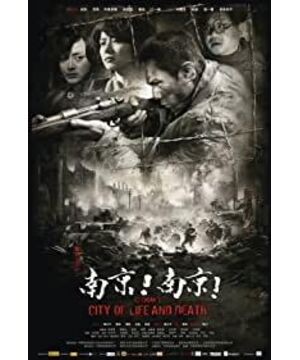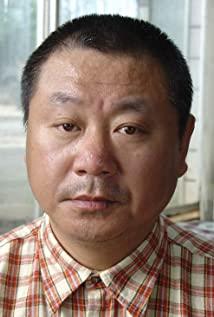This seems to be a common problem in Chinese commercial films. Technical art and performance are high scores, while the soul that supports the whole work is scumbag. For example, every time I go to the theater, I seem to encounter such a male prostitute - asking price Tall, good-looking, sexually motivated, that big talk, plenty of foreplay, and then premature ejaculation. We are used to such one-stop service, used to slap him, and then habitually continue to patronize.
"Nanjing! Nanjing! "Before the end, there was not even a single flashback. This pseudo-documentary style is frustrating, which directly leads to the biggest problem of the movie - incompleteness.
First of all, the plot and values are incomplete - there is no beginning and end without cause and effect, the audience is not all full of history, there will always be questions, why did the soldiers abandon the city like crazy at the beginning of the movie? Why was it blocked? Why not let the people flee earlier? After two hours of Chinese people giving their lives to their deaths and a Japanese vulnerable soldier crushing himself, the last few photos try to bring a sense of reality to the audience to soothe the audience's emotions, but these characters are fictional. It's different from the "truth" that Lu Chuan keeps talking about. The words "Xiaodouzi is still alive" are moving as the ending, but it's just moving.
The ending I want to see is: use a few historical photos (this is really considering the cost of the film for Lu Chuan) to show that Japan was defeated and surrendered in World War II, the Japanese army went back to their hometown, the new China was established, and the Chinese were tried in Tokyo. Winning, China and Japan have become friendly, and Japan has not only refused to fully recognize the Nanjing Massacre, but still visits the Yasukuni Shrine led by the Prime Minister every year. These photos range from black and white to color, and are finally fixed in today's Nanjing, ending with a panoramic view of the city overlooking Nanjing, showing a prosperous and prosperous spirit. In this way, "Nanjing! Nanjing! ” will not remain in that suffocating and humiliating history, and the proposition of “Nanjing” should not be limited to the Nanjing Massacre, but should be given a broader meaning.
Secondly, the looseness of the plot - the letters that appear intermittently in the film and a few lines of small print in the notes - I'm sorry I can't see it, and I believe most people can't see it clearly, from the picture, it may just be art From the perspective of narrative, this is really a poor move by Lu Chuan's screenwriter. Maybe, these small words can explain some of the plot bugs that are currently being discussed fiercely by everyone.
From the perspective of characters, Kadokawa's story is completely unreliable. Nanjing could not be the first place where the Japanese army landed in China. The Japanese army came all the way to Nanjing, so the strong innocence, purity and fragility exuded by Kadokawa can only be explained by saying "I studied in a missionary school". No way. Kadokawa's suicide, as an extremely unique example in the Japanese army, has no representation, and his death is as contrived as his naivety. It would be far-fetched for him to commit suicide by violating his teachings and military discipline, if only Jiang Shuyun triggered his idea of atonement. In short, the plot was simply not enough for the audience to understand. Kadokawa died in a sloppy and ugly way. If he really wants to die, he might as well cut his belly. The inability of Kadokawa's line made him seem redundant. In contrast, the Japanese officer who had his face twitching when he executed the Chinese was even more impressive. The officer's plot line would be vivid with a little polish-describe clearly a How can people become bloodthirsty devils because of the persecution of war, and then let this devil be touched by various events, return to human nature, and realize self-redemption, this line is much stronger than Kadokawa.
For Mr. Tang's SOLO death, the movie didn't give him a specific reason why he had to die like this. It felt like "you deserve to be unlucky if you stay here. If you want to die, die quickly. Why don't you come to a special show!"
Jiang Shuyun's death, I personally I feel that this part of the plot is quite shocking. It is said that Lu Chuan originally wanted her to be raped by the Japanese. I think Lu Chuan has a dream of making an AV, and doing it every day is not enough...
Lu Jianxiong's death was a mess. In the plot before editing, Lu Jianxiong was killed by the Japanese army. This scene could have calmed down "Long Live China" "The abrupt feeling of the slogan, but it was harmonious. I have nothing to say about Lu Chuan's editing techniques.
Douzi and Shunzi ran away, why? It would be great if we could arrange some rival scenes between Douzi and Jiao Chuan. For example, Douzi reminded Jiao Chuan of his younger brother who died early in his hometown. I feel that Jiao Chuan put them out of the city purely to choose a good feng shui for the suicide location.
The Japanese army, except for Kadokawa in individual scenes, whether they should be wretched or wretched, did not feel that there was any major breakthrough. Again, Kadokawa is too abrupt, too unrepresentative, too fake.
For that piece of Japanese dance, I don't think it's very good, but it shows that the scene set up by the movie is just a little bit.
I don't think the movie is from a Japanese perspective. There is no psychological monologue for Kadokawa, and of course Lu Chuan doesn't dare, let alone any flashbacks for him. It feels like the director is calm, but just tired. Now "Nanjing! Nanjing! ” is at best a panoramic pseudo-documentary historical film.
As the last bean to survive, if the old bean can be the main narrator of the whole film, it is better than anything else.
In the end, it's actually a question of the script. The responsibility for all this should undoubtedly be attributed to Lu Chuan.
"Nanjing! Nanjing! "The English name is "The City of Life and Death", and anyone who has seen the movie knows that this title is much more appropriate than the Chinese name that is hoarse and swaggering. These two titles directly reveal Lu Chuan's eagerness for success in the domestic market and his coquettish coquettishness in the international film circle.
Lu Chuan said that he read a lot of materials, and it was very difficult to complete the work... Please, as a director, being dedicated is your basic quality, okay? In Nanjing! Nanjing! In ", I did see Lu Chuan who had read a lot of books, but I also saw Rabe who was unkempt and kneeled to the Chinese, countless plot holes, and AV signs of a scene between Kadokawa and Yuriko. I have to wonder if he sees all the books in his asshole. There is no difference between Lu Chuan, who is madly filling up historical materials, and the graduates who search a lot of data on the Internet to fill their theories in order to make a graduation thesis. He has the courage to write the script himself. I hope the majority of film practitioners can learn from this behavior.
In any case, the incomplete "Nanjing! Nanjing! "A success at the box office, this film is indeed solid enough as a golden stepping stone on the road to Lu Chuan's ambition.
I keep that history in mind, I also respect Lu Chuan's 4 years of hard work, and I also acknowledge "Nanjing! Nanjing! "A piece of precious value in the history of Chinese film, but I really can't agree with Lu Chuan's ability and character.
Finally, let's talk about the scale issue... It's actually very interesting, because according to convention, within half a year to a year, "Nanjing! Nanjing! " will be broadcast openly on CCTV6. According to the new regulations of the State Administration of Radio, Film and Television, "Nanjing! Nanjing! 》 can also be freely disseminated on the Internet. Personally, I didn't understand the position of a man and a woman to do that thing until I was 14 years old, and I didn't understand the specific appearance of condoms until I was in my 20s, so the scene broadcast on TV to audiences of all ages will be very intense.
But... Having said that, I don't think these scenes are actually new to the post-90s generation. Well, besides, Imperial Court Six has always had a history of heavy taste. Many years ago, the broadcast of "Extremely Deep Cold" once It has influenced my young mind and played an indelible role in my ability to grow into the tough young woman I am today.
That's about all I want to say. When I watched the film, I scolded a little brother who was laughing from time to time in the movie theater, so that my boyfriend tugged at my sleeve. I think the reason was that my words were too vulgar. The good thing is that the little brother never made any annoying noises again.
View more about City of Life and Death reviews











